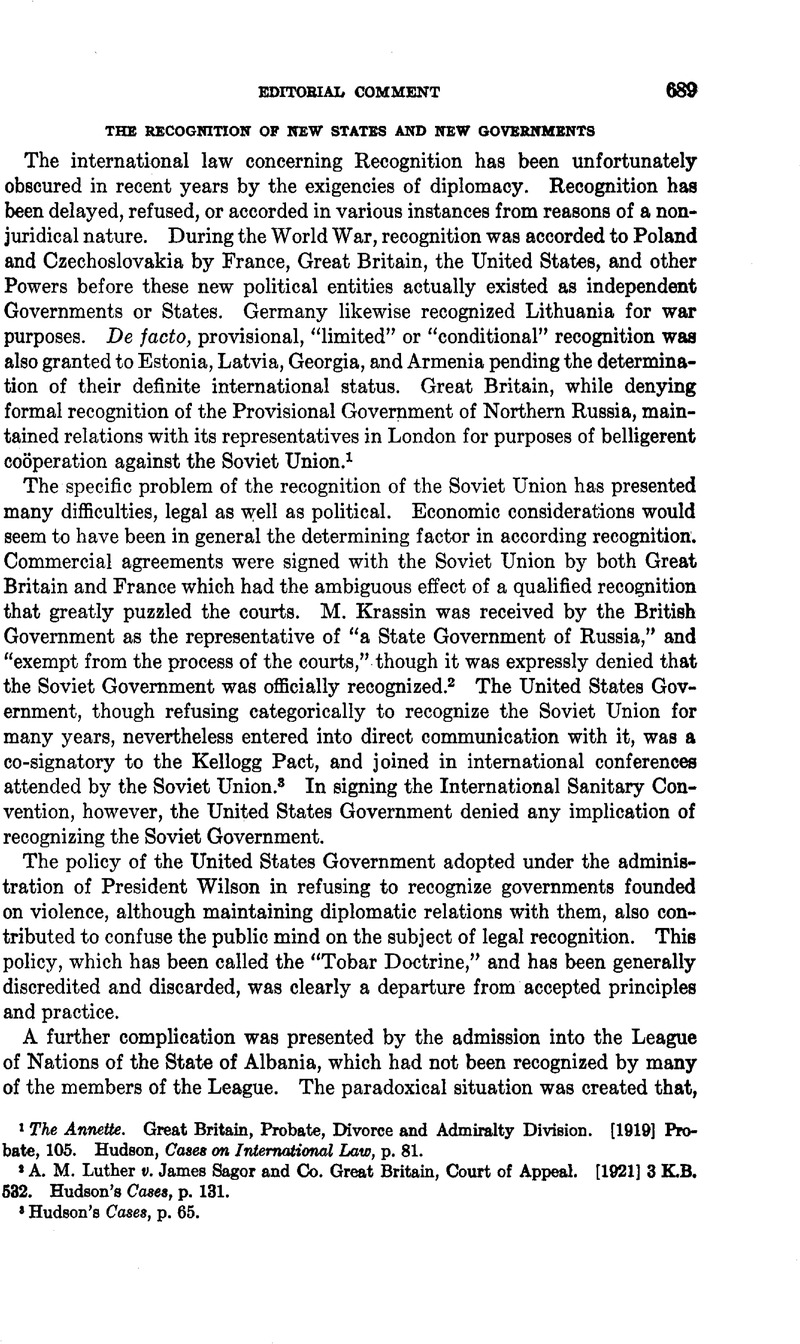No CrossRef data available.
Published online by Cambridge University Press: 12 April 2017

1 The Annette. Great Britain, Probate, Divorce and Admiralty Division.[1919] Probate, 105. Hudson, Cases on International Law, p. 81.
2 Luther, A. M. v. James Sagor and Co. Great Britain, Court of Appeal.[1921] 3 K.B.532. Hudson’s Cases, p. 131.Google Scholar
3 Hudson’s Cases, p. 65.
4 Erich, “Naissance et reconnaissance des Etats,” Academie de Droit International, La Haye, 1926, Vol. XIII, p. 431.
5 Pelzer v. United Dredging Company, 118 Misc. Rep. 210, 193 N. Y. Supp. 675.
6 Russian Socialist Federated Soviet Republic v. Cibrario. Court of Appeals of New York, 1923, 235 N. Y. 255, 139 N.E. 259. Hudson’s Cases, p. 91.
7 Lehigh Valley Railroad Co. v. State of Russia. U. S. Circuit Court of Appeals, Second Circuit, 1927, 21 F. (2d) 396. Hudson’s Cases, p. 96.
8 Banque Industrielle de Moscou v. Banque Russe pour le Commerce et l’Industrie. Trib.civil Seine, May 20, 1921. 50 Clunet, p. 533.
9 Banque Internationale de Commerce de Petrograd v. Goukassov, 1923. Great Britain, L.R., 2 K.B. 682; Russian Commercial and Industrial Bank v. Comptoir d’Escompte de Mulhouse, 1923, L.R. [1925] A.C. 112; Court of Appeal, L.R. [1923] 2 K.B., 630. See John G., Hervey, The Legal Effects of Recognition in International Law as Interpreted by the Courts of the United States, pp. 101–103.Google Scholar
10 See George, Nebolsine, “The recovery of the foreign assets of nationalized Russian corporations,” Yale Law Journal, June, 1930, p. 1130Google Scholar.
11 In the case of Sokoloff v. National City Bank, Mr. Justice, Cardozo took the advanced position indicated in the following excerpt from his opinion:Google Scholar
Juridically, a government that is unrecognized may be viewed as no government at all, if the power withholding recognition chooses thus to view it. In practice, however, since juridical conceptions are seldom, if ever, carried to the limit of their logic, the equivalence is not absolute, but is subject to self-imposed limitations of common sense and fairness, as we learned in litigations following our Civil War. In those litigations, acts or decrees of the rebellious governments, which, of course, had not been recognized as governments de facto, were held to be nullities when they worked injustice to citizens of the Union, or were in conflict with its public policy… . On the other hand, acts and decrees that were just in operation and consistent with public policy were sustained not infrequently to the same extent as if the governments were lawful… . These analogies suggest the thought that,subject to like restrictions, effects may at times be due to the ordinances of foreign governments which, though formally unrecognized, have notoriously an existence as governments de facto Consequences appropriate enough when recognition is withheld on the ground that rival factions are still contending for the mastery may be in need of readjustment before they can be fitted to the practice, now a growing one, of withholding recognition whenever it is thought that a government, functioning unhampered, is unworthy of a place in the society of nations. Limitations upon the general rule may be appropriate for the protection of one who has been the victim of spoliation, though they would be refused to the spoliator or to others claiming under him. We leave these questions open. At the utmost, they suggest the possibility that a body or group which has vindicated by the course of events its pretensions to sovereign power, but which has forfeited by its conduct the privileges or immunities of sovereignty, may gain for its acts and decrees a validity quasi governmental, if violence to fundamental principles of justice and to our own public policy might otherwise be done. (Sokoloff v. National City Bank, Court of Appeals of New York, 1924, 239 N. Y. 158, 145 N.E. 947.)